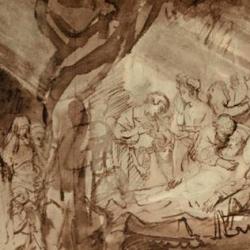Slavery is back in the local news, and it?s a good time once again to reflect on how we should deal with this subject. First and foremost, we must examine what the Scriptures say about slavery, since the Bible is our ultimate authority of faith and practice.
A central theme of the Bible in this regard is the liberation of slaves. Israel was defined as the people whom Yahweh had delivered from slavery in Egypt, Jesus preached a year of release and claimed to be the Incarnate Truth that would make men free, and Paul preached that ?it is for freedom that Christ set us free.?E Wherever the gospel triumphs, liberty follows. As Pastor Wilson has said, ?the logic of the Great Commission requires the eventual death of slavery as an institution in any place where it might still exist. While Christian slaves were commanded to work hard for their masters, Christian slaves were also told to take any lawful opportunity for freedom (1 Cor. 7:20-24). This indicates that slavery as an institution is inconsistent with the fundamental Spirit of the gospel, who is the Spirit of liberty (2 Cor. 3:17).?E
At the same time, the Bible teaches that everyone is a slave to someone or something. Sinners outside of Christ are slaves of Sin and Death, and free in regard to righteousness; those who have died with Christ in baptism are delivered from slavery to Sin, but become slaves of God. Liberation from one master always leads to submission to another. There is no liberty without lordship. Even when it speaks of liberty, Scripture is not egalitarian.
Because human beings are slaves of Sin and Death, slavery exists in society, and the Bible does regulate it. Holding slaves is not, in itself, forbidden in Scripture. Abraham had slaves, the last gives instructions about proper treatment of slaves, and Paul addresses members of the apostolic churches who had household slaves or servants of some sort.
Within Israel, slavery was a form of bond-servanthood that functioned as a means of rehabilitation. If an Israelite became too poor to support himself, he could sell himself to another Israelite, who would hold him for six years. During those six years, ideally, the master would be training the servant to live independently, so that when he was released in the Sabbath year, he would be able to live responsibly as a free man. Such bond-servanthood was not to be perpetual, nor was it designed to keep the slave in his subservient place. It was designed to restore him to a productive and free life in Israel.
The slavery of the American South fails to pass biblical muster on several counts. It was racially based, and often grounded in racist beliefs. Even when the slaves were believers, they were not freed and were frequently not treated as brothers in the Lord. Well into the twentieth century, blacks were often not welcome to sit with whites in church, much less lunch counters and buses. American slavery, further, could not have existed without the slave trade, which depended on kidnapping, and slave families were broken apart. No doubt, the effects of slavery were ameliorated in many ways because the slave-holders were Christians, but slavery is a wound in American race relations that still festers in many parts of our country. Lincoln was right to say that the Civil War was a manifestation of the just judgment of God. There is nothing to celebrate here, and much to grieve.
But, we must not forget that the slave-holders were often fellow believers, brothers and sisters in Christ. We cannot dismiss Southern slavery as ?a Confederate problem?Eany more than we can dismiss homosexual bishops as an ?Episcopal problem.?E Nor, as Chris Schlect pointed out to me, can we evade the abuses of the Inquisition as a medieval catholic problem, the Salem Witch Craze as a Puritan problem, or televangelist moral scandals as a fundamentalist or charismatic problem. The church is one, and when one member sins all are affected. For all its failures and sins, the old South was an outpost of Christian civilization. We stand with the Christians of the old South, not ignoring their sins, but also honoring them, for all their flaws, as fathers in the faith.











